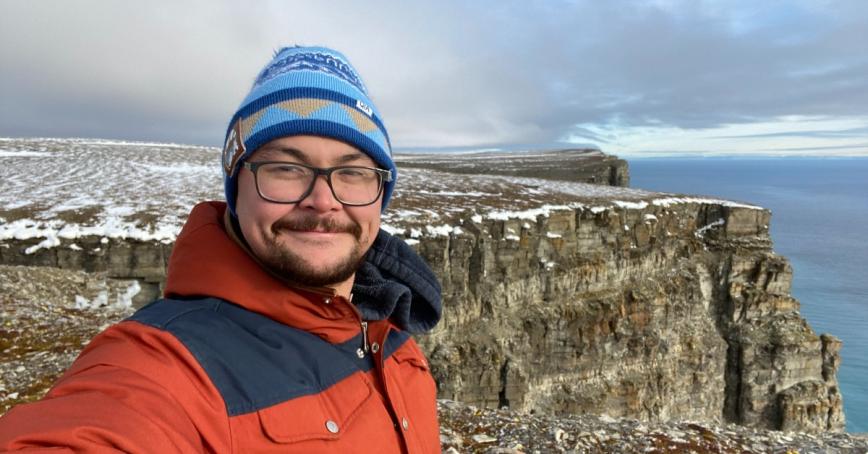A Journey of Purpose and Cultural Preservation
Topics
Featured
Share online

Learn more about the Master of Science in Environmental Practice program.
On an Arctic island, where ice-capped mountains and tundra valleys dominate the landscape, one Royal Roads student has been gaining recognition for his dedication to conservation and Inuit self-determination. Josh Komangapik, an Inuk hailing from Iqaluit, Nunavut, took a winding road to find his way home.
The Master of Science in Environmental Practice student, recently honored with the first CAFF Arctic Indigenous Canadian Youth Fellowship, undertook a non-linear journey toward environmental stewardship. “I changed my undergrad program like four times because I didn’t know what I wanted to do,” he recalls with a laugh. Yet, amidst the uncertainty, one thing remained constant: a connection to his home community.
After completing a college diploma and a Bachelor of Arts in geography in Quebec, Komangapik returned to Iqaluit in 2019 with his partner Daniel, eager to make a difference. He began his career in protected area management with Parks Canada, later transitioning to Environment and Climate Change Canada, where he focused on preserving Migratory Bird Sanctuaries.
"I decided I wanted to try something different, more related to contaminants because in the North, we have a long history of historical and legacy contamination," shares Komangapik, highlighting the threat posed by the bioaccumulation of contaminants in the Arctic food chain such as caribou, whales and seals.
Motivated to address local environmental challenges, Komangapik sought a graduate program that would allow him to remain in his community. Royal Roads University provided the perfect platform, enabling him to pursue his MEP without leaving home.
While he misses the camaraderie of classroom learning, Komangapik cherishes the opportunity to be close to family and offer support when needed. "Keeping that connection has helped motivate me," he shares. His coursework, spanning a variety of topics including contaminants, ecosystems science and environmental communication, solidified his aspirations.
“I feel like my mind is being expanded, and the courses I’m taking are helping me figure out my path forward."
In addition to his studies, in April 2023 Komangapik embarked on a year-long Indigenous Fellowship with the Conservation of Arctic Flora and Fauna, the first of its kind. Drawing insights from the coastal biodiversity monitoring program, he analyzes extensive data sourced from the SIKU app—an innovative platform led by the Arctic Elder Society, tailored to the Inuit community's needs.
In late November, the Inuit Circumpolar Council Canada organized a kick-off workshop in Ottawa, welcoming Komangapik in his role as the CAFF Arctic Indigenous Canadian Youth Fellow. The workshop facilitated connections with representatives from various organizations, including the Circumpolar Biodiversity Monitoring Program Coastal Group and the Arctic Eider Society.
Komangapik's master's experience has broadened his horizons, equipping him with valuable skills and connections for future endeavors in Canada and abroad.
"Being able to travel internationally in a place I’ve never been to in another part of the Arctic is exciting," shares Komangapik, highlighting his upcoming presentation at a marine biodiversity conference in Tromsø, Norway.
After completing the MEP program, Komangapik plans to build on his learnings with the aim of pursuing a PhD related to contributing to Inuit self-determination in research.
“Working in the environmental field in Nunavut, it’s the best way I can try to make a difference for our territory,” says Komangapik.
Looking ahead, Komangapik stresses the importance of community-based adaptation strategies in combating climate change. He advocates for global accountability in mitigating toxic substance emissions, emphasizing Canada's role in advocating for Arctic health.
"To younger people, I say, explore your strengths, whether traditional or otherwise," shares Komangapik, underscoring the significance of accessible education for Arctic communities in navigating the challenges ahead.
Learn more about the Master of Science in Environmental Practice program.